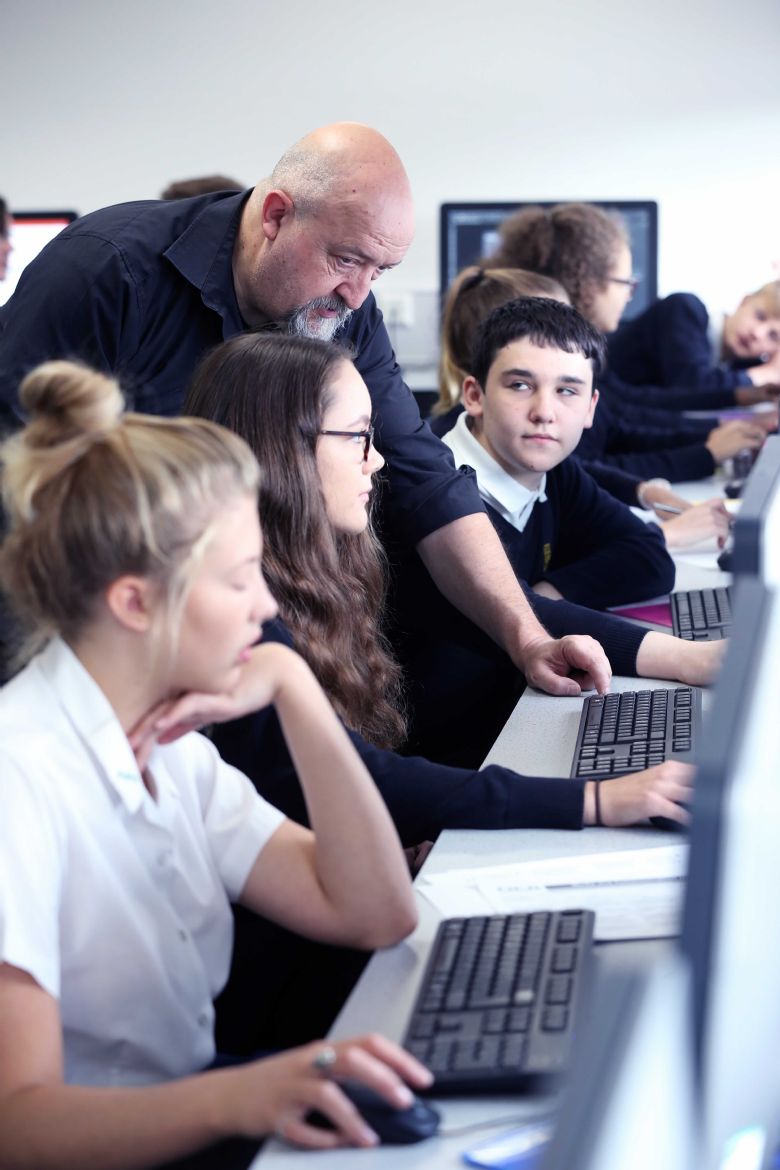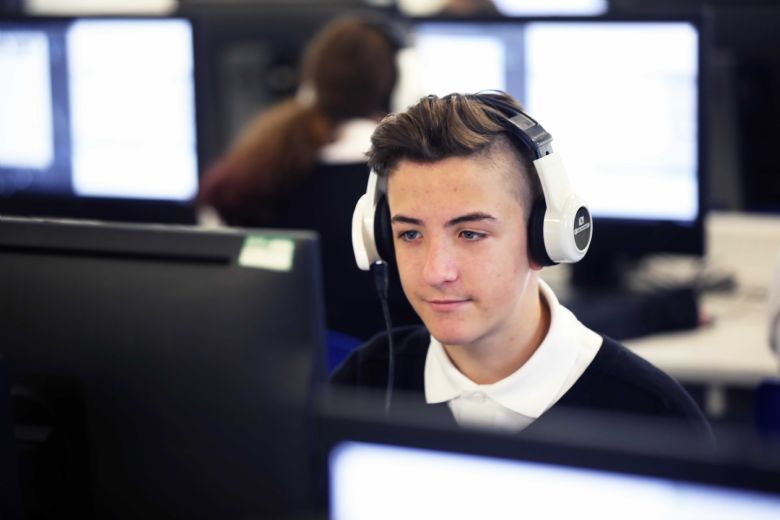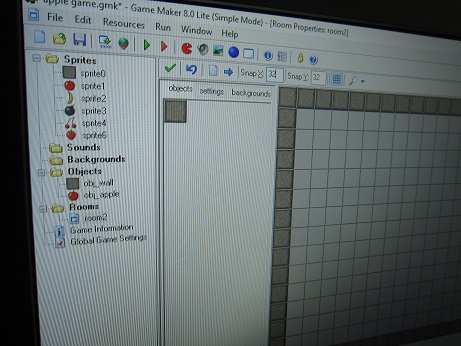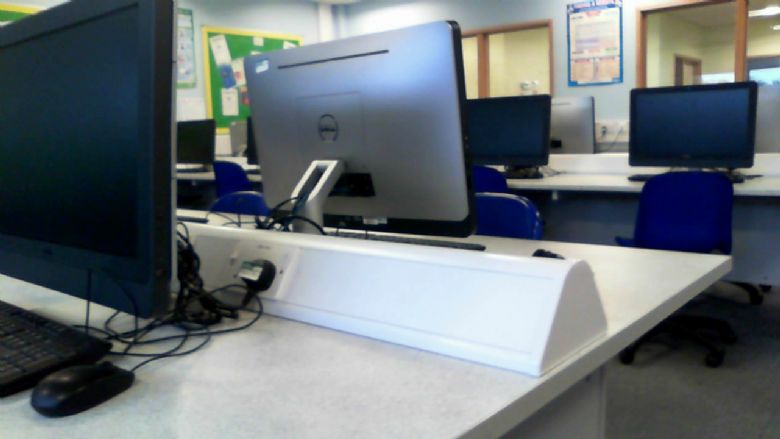Computing

The Computing department aims to promote the creative use of digital applications and ability to use programming languages to create solutions to IT problems. We equip learners with the skills they need to live, learn and earn in the 21st century by developing their ability to organise themselves and their work and by encouraging them to reflect critically on their own and others’ use of Computing.
As the use of IT in the workplace and in college/university courses change, the curriculum changes to respond to the future needs of the students. We have a strong Computer Science and IT curriculum at all Key Stages, with some students obtaining successful places at university on completion of Key Stage 5. At all Key Stages we also provide key skills for not only the courses in the next Key Stage, but for students to successfully use IT in a range of subjects and contexts.
Key Stage 3
In Year 7 Students are introduced to the SharePoint environment and are given a range of online accounts to include Microsoft Teams, where they can access resources and submit work. They are also provided with an Office 365 account, which gives access to online and offline software used in the school. Each student is given a OneDrive account, where they access and store their own work at school and at home. Students start with learning Key Skills, where we bridge the gap in learning the key IT skills needed for a range of subjects and contexts, which includes using Teams, OneDrive and Office 365.
In IT students learn Internet safety, where we ensure that students protect themselves against risks involved with online activity and mobile phone use. Students also learn one of the most used software in business, Spreadsheets, where they learn how to create accounting spreadsheets and use these to model scenarios. We complete the year with a project where students create a range of business publications for a scenario, using a range of suitable software. Students identify the purpose and uses of the range of software to create publications that are suitable for the purpose set.

In Computer Science students will start to develop programming skills using a block-based programming language called Scratch. They will focus on understanding the basic programming concepts that are relevant to all programming languages. Students will also understand how networks can be used to retrieve and share information and the associated risks. They will be able to explain why the World Wide Web is not the same as the Internet.
Year 8 IT units include Animation, where students learn the theory and skills involved in creating animations using Blender. This links into the use of multimedia in KS4 in IT and Media studies. Later in the year, students learn how to create a website using HTML and identify web protocols and security.
In Computer Science units, students will move on to learning a text-based programming language called Python, to solve a variety of computational problems. A key focus in Year 8 will be understanding why computational thinking helps us solve problems. Students will develop skills in how to create algorithms and programs to achieve their goals. They will learn how data of various types (including text, sounds and pictures) can be represented and manipulated digitally, in the form of binary digits. They will understand how numbers can be represented in binary and be able to carry out simple operations on binary numbers.
Year 9 IT focuses on topics that lead into the KS4 IT course. Students learn the theory and skills of Augmented reality; they identify the uses of this and create an Augmented reality product of their own. This leads into one of the KS4 IT units where they complete an Augmented reality project for coursework. Students also further deepen their understanding and skills in Spreadsheets, to prepare them for the Spreadsheets coursework unit in the KS4 IT course.
In Year 9 Computer Science students will continue to develop skills to design, use and evaluate programs using Python. This will include making appropriate use of data structures such as arrays and how to design and develop modular programs that use procedures or functions. They will understand the hardware and software components that make up computer systems, and how they communicate with one another and with other systems. They will understand simple Boolean logic [for example, AND, OR and NOT] and some of its uses in circuits and programming. To further embed online safety, students will develop cyber skills, and the knowledge necessary for cyber-secure behaviour.
Key Stage 4

Computer Science
IT
Post 16
Computer Science
The linear GCE in Computer Science comprises of two examination units and one coursework unit. The Computer Systems examination unit comprises of topics such as computer hardware, software, exchanging data, data types and structures and legal, moral, cultural and ethical issues. The Algorithms and programming examination unit comprises of topics such as elements of computational thinking, problem solving and programming and algorithms. The examination units include in-depth knowledge of the topics and the application of this knowledge on a new context.
The third unit involves students following the development lifecycle to plan, design, develop, test and evaluate a solution to a programming problem. Students are able to choose a programming problem of their choice, ranging from games to data solutions and can choose from a range of programming languages to code the solution. Students gain an in-depth understanding and experience of the range of product development documentation and learning from the iterative approach to product development.
ICT
The Cambridge Technicals in IT vocational course builds on the hands-on approach learnt in Key Stage 4. The course comprises of 5 units, two are exam units and the other 3 units are coursework.
In unit 21 Students learn Web Authoring techniques with specialised software that includes learning HTML, CSS and JavaScript. They follow a product development lifecycle to create a website of their choice and the accompanying project documentation. They learn about client involvement and correct correspondence with a client in the design and development of the website.
In unit 6 and 9 students learn about prototyping, the iterative development model and further client involvement with a specific client brief to create a Database solution using specialised software. Students gain an in-depth understanding and practice of development testing and acceptance testing using a focus group.
The unit 1 exam provides a strong understanding of IT technologies and practices that are essential for IT professionals. Content includes hardware, networks, software, data representation, ethical use of computers and how business uses IT.
In the unit 2 exam unit students learn about the uses of information in the public domain and globally by individuals and organisations. This includes learning about the good management of data and information, and how it is used internally and externally to give an organisation a competitive edge. Students will gain a greater understanding of the legislation and regulation governing information and the constraints and limitations that apply to all organisations.
How I can support my child?
Parents can support their child/children in Computing in the following ways:
- Regularly check Teams assignments and their planner to ensure that they are completing all learning
- Be aware of any correspondence from the teacher, with notice of tests and coursework deadlines. Support their child in revision and completing coursework by the deadline.
- Provide a quiet environment for homework where distractions are kept to a minimum
- Support their child with their homework and remind them of resources that they can use
- Identify the use of IT in everyday life
- Ask questions about what they are learning and encourage them to show you their work and assessments, so they take pride in their work



